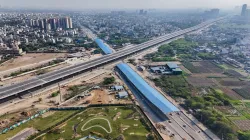India's highway revolution: Major expressways like Delhi-Mumbai, Bengaluru-Chennai to be completed by 2025
India's Ministry of Road Transport and Highways (MoRTH) is set to complete several key expressways by 2025, including the Delhi-Mumbai and Bengaluru-Chennai expressways. These projects are part of a broader initiative to enhance the quality and connectivity of the country’s road infrastructure.

The Ministry of Road Transport and Highways (MoRTH) is set to complete highway expressways by 2025, making it a key component of India’s highway infrastructure. Over the past decade, MoRTH has developed an impressive network of National Highways (NHs) that is 56,700 kilometers long and has greatly expanded the country's road network. Now, the focus is shifting toward improving the quality of construction and maintenance to ensure safer and more efficient travel for road users.
Expansion of national highway networks
Since 2013-14, the length of national highways has increased from 91,000 km to 146,000 km, reflecting MoRTH’s commitment to increasing connectivity. However, there has been concern over the quality of the highways, including the Delhi-Jaipur section (NH-48) and the Amritsar-Jamnagar Economic Corridor. To address these issues, the ministry has pledged to prioritize quality in its future projects under the leadership of the newly appointed Highways Secretary, V Umashankar.
Major expressways to enhance connectivity
Major expressways, including the Delhi-Mumbai Expressway, Delhi-Dehradun Expressway, and Bangalore-Chennai Expressway, will be completed by 2025. These projects are expected to reduce congestion, speed up travel, and provide a smooth travelers experience.
New approach to highway development
MoRTH is moving from a project-based to a corridor-based development model, ensuring consistent quality, better logistics efficiency, and improved user convenience. A comprehensive transport study leveraging GSTN and toll data has identified 50,000 km of high-speed highway corridors, with 4,827 km expected to be operational by the end of the fiscal year.
Technological integration and barrier-free toll collection
To improve user convenience, MoRTH plans to introduce a multi-party interoperable system for barrier-free toll collection, using satellite navigation technology to streamline toll transactions and reduce travel delays.
Maritime infrastructure boost
Alongside road improvements, the government is investing in the maritime sector, with significant projects such as the construction of Vadhavan Port and major upgrades to Kandla, Tuticorin, and Galathea Bay Transshipment Hub. These projects aim to strengthen India’s maritime capabilities and enhance the nation’s port and shipping industry.
With a focus on quality, transparency, and sustainability, MoRTH’s initiatives are set to transform India’s transportation landscape, helping drive the country’s growth while improving infrastructure for future generations.
Also read | Stage 3 GRAP restrictions imposed in Delhi-NCR as air pollution worsens